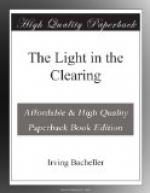I was seven years old when Uncle Peabody gave me the watermelon seeds. I put one of them in my mouth and bit it.
“It appears to me there’s an awful draft blowin’ down your throat,” said Uncle Peabody. “You ain’t no business eatin’ a melon seed.”
“Why?” was my query.
“’Cause it was made to put in the ground. Didn’t you know it was alive?”
“Alive!” I exclaimed.
“Alive,” said he, “I’ll show ye.”
He put a number of the seeds in the ground and covered them, and said that that part of the garden should be mine. I watched it every day and by and by two vines came up. One sickened and died in dry weather. Uncle Peabody said that I must water the other every day. I did it faithfully and the vine throve.
“What makes it grow?” I asked.
“The same thing that makes you grow,” said Uncle Peabody. “You can do lots of things but there’s only one thing that a watermelon can do. It can just grow. See how it reaches out toward the sunlight! If we was to pull them vines around and try to make ’em grow toward the north they wouldn’t mind us. They’d creep back and go reachin’ toward the sunlight ag’in just as if they had a compass to show ’em the way.”
It was hard work, I thought, to go down into the garden, night and morning, with my little pail full of water, but uncle said that I should get my pay when the melon was ripe. I had also to keep the wood-box full and feed the chickens. They were odious tasks. When I asked Aunt Deel what I should get for doing them she answered quickly:
“Nospanks and bread and butter—ayes!”
When I asked what were “nospanks” she told me that they were part of the wages of a good child. I was better paid for my care of the watermelon vine, for its growth was measured with a string every day and kept me interested. One morning I found five blossoms on it. I picked one and carried it to Aunt Deel. Another I destroyed in the tragedy of catching a bumblebee which had crawled into its cup. In due time three small melons appeared. When they were as big as a baseball I picked two of them. One I tasted and threw away as I ran to the pump for relief. The other I hurled at a dog on my way to school.
So that last melon on the vine had my undivided affection. It grew in size and reputation, and soon I learned that a reputation is about the worst thing that a watermelon can acquire while it is on the vine. I invited everybody that came to the house to go and see my watermelon. They looked it over and said pleasant things about it. When I was a boy people used to treat children and watermelons with a like solicitude. Both were a subject for jests and both produced similar reactions in the human countenance.
Aunt Deel often applied the watermelon test to my forehead and discovered in me a capacity for noise which no melon could rival. That act became very familiar to me, for when my melon was nearing the summit of its fame and influence, all beholders thumped its rounded side with the middle finger of the right hand, and said that they guessed they’d steal it. I knew that this was some kind of a joke and a very idle one for they had also threatened to steal me and nothing had come of it.




